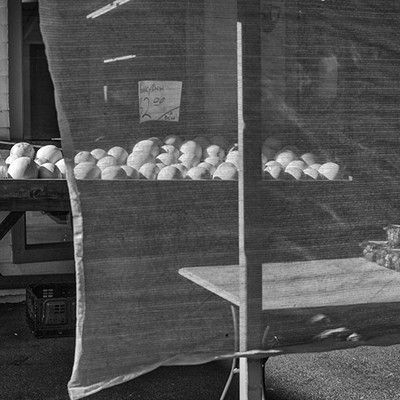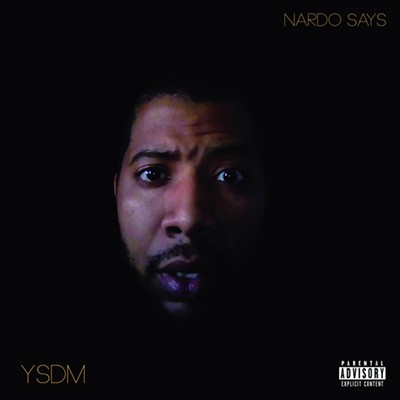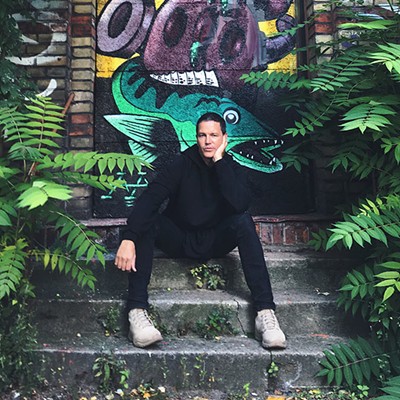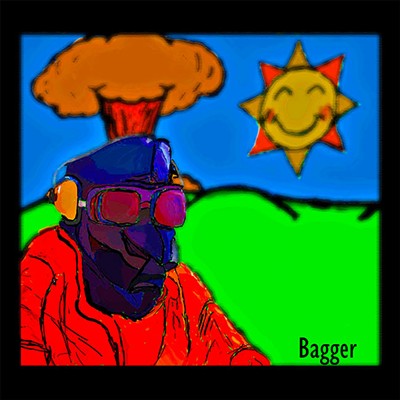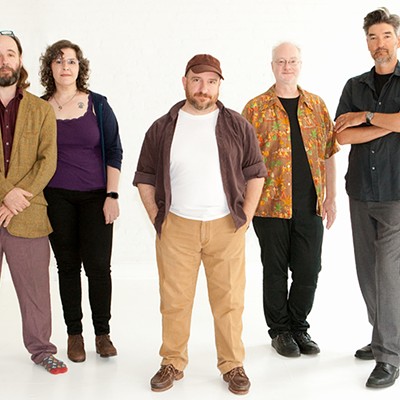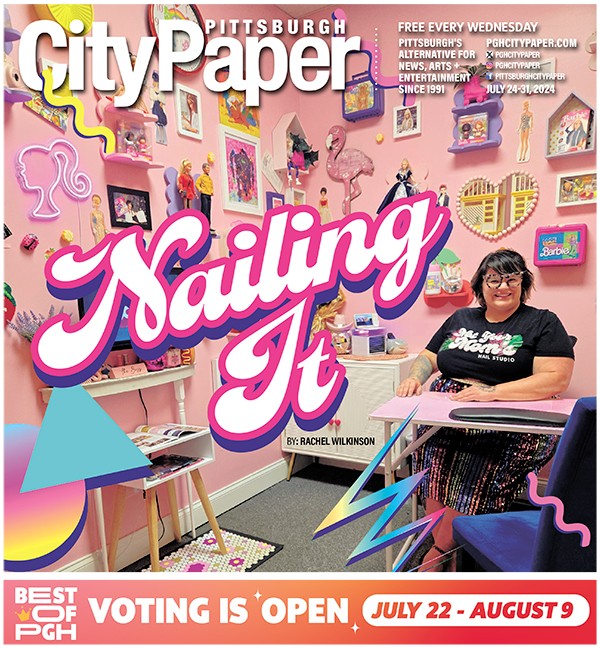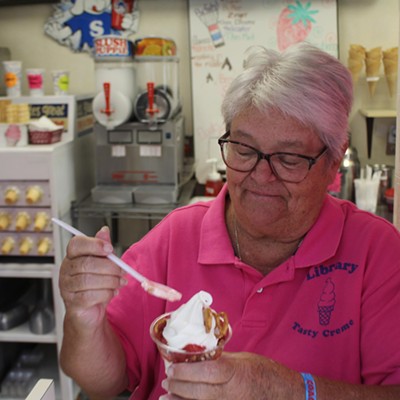Wednesday, October 5, 2016
A conversation with Andrew Bird
Andrew Bird, the Chicago-bred multi-instrumentalist, composer and world-class whistler, returned to the world of pop this year with a new record called Are You Serious. Bird has an appetite and keen ear for sprawling, challenging instrumentals but they have no place on this record.
Are You Serious is clean, inviting pop music that doesn't overreach or ask too much; it's grown-up stuff. "Truth Lies Low" is an easy highlight, pairing an addictive, repetitive riff with Bird's signature distorted violins. Sometimes listening to Bird is like pouring sugar on chocolate — he's just too sweet, the whistling is too perfect, the textures are too darn silky. He's at his best when he aims small, as he does on Are You Serious.
CP spoke with Andrew Bird by phone ahead of his show on Sat., Oct. 8 at the Byham Theater.
Your first release was Music of Hair in 1996. If 1996 Andrew Bird could time-travel to the future and hear your new album Are You Serious, how would he feel about it?
I started Music of Hair when I was like 19, and I was definitely into more things that might appeal to a 19-year-old music student. I was maybe a little more muso back then. I appreciated complexity, and now I appreciate conciseness.
Do you think he’d like it?
Good question. I think there’s enough there still that I would have liked, that my former self would have liked, but I probably would have thought it’s a little poppy …
I’m always interested in your tracks that have minimal instrumentation. You play so many instruments and their layering plays an important role in how your songs sound when they’re finished, so I’m surprised when you do something minimal. On your latest album, “Chemical Switches” is the most minimal, just an acoustic guitar, your voice and a whistle. Why did you hold back on that one?
I didn’t plan on it. But I was working closely with Blake Mills, and he had a take on the song that was … The first time I ever played with him we did a Nick Drake cover, for something that never came out, and we kinda connected over that. I guess maybe he’s taking it there, toward a John Martyn, Nick Drake kind of English folk thing, which we both had an appreciation for in the past. Every attempt to do that with a full band sounded kind of ... it just wasn’t working. He had a pretty inspired approach to it.
I thought there were gonna be overdubs, I thought I’ll probably replace the whistle with violin. That’s a live recording; after many, many takes, I was kinda exhausted and broken down. We had to resist the urge to do anything to it. I tried replacing the whistle — this always happens. I’ll just whistle to hold the melody, but nothing can beat it, it’s so honest. And I tried putting violin in there, and it sounded kind of Celtic. We just left it.
I feel like your body of work has two sides, the structure-based stuff with lyrics, and your instrumental work which is much more repetitive and abstract, like the songs on Useless Creatures. When did you first get into repetition in music?
I have to admit the technology led me to it. I started looping maybe 12-15 years ago, and I just thought, "Oh, this is kind of a cool compositional tool, I can create counterpoint." It suits my creative process. I don’t write things down. I’m not a classical composer, so I don’t get too precious about this is what I intended, here it is on the page written down. I like kinda fast, intuitive stuff, and looping suits that well. But in a way, it did change my music, because before I got into looping, I would have a lot of bridges, segues, my writing was very linear, I didn’t like to repeat myself at all. But the looping also led me to interesting patterns that a lot of modern composers have worked with.
Something like “Hot Math” off Useless Creatures is just kinda like a field recording, stumbling on something that I’ve never been able to replicate. I know all the parts that make up the whole and break them out, but I can’t replicate that groove. You can tell from that recording, I have no interest in stopping playing that. It just fades out. Either it’s in your bones that day or it’s not.
“Hot Math” arrives fully formed, as you said. It fades in and fades out and is more or less consistent for its 10-minute run. Whereas “You Woke Me Up!” (also from Useless Creatures) is also repetitive, but it doesn’t arrive fully formed. It builds up from nothing. Did you approach those songs differently?
Yeah, “You Woke Me Up!” was kind of, I had that pattern going and I dropped it. … That song was based more on that dropping everything to half-speed, down an octave, how it kind of slows everything down.
You said the technology led you to adopt repetition into your music 12-15 years ago. Is there any technology now that’s inspired a change in the way you compose?
I don’t know. For instance, I keep having these opportunities to do symphonic work and I keep balking because I’m really most interested in reacting to my environment, creating a human connection on stage, and I can’t really think of anything with more opportunity for disconnect or losing that connection than to do a big symphonic version. I like to keep it to scale.
Technology is very intuitive. It’s not a replacement of human beings. In fact, it kinda helps me connect to my audience, because of the opportunity for failure. ... A lot of people use technology in recording to eliminate chance, and I use technology on stage to increase my chance of failure, and thereby kind of creating an empathy with the audience.
On that note, your series Live From a Great Room uses technology to connect with your audience, though in an indirect internet sort of way. With that series, were you more interested in connecting with your fans in real time, or in collaborating with artists you respect and want to work with?
I think it’s more about what’s happening in the room. Getting over the initial awkwardness of addressing a phone that’s recording us, instead of a human audience. You know, I just turn to my guest and try to connect with them. I feel the presence of the audience, [but] there’s just no applause.
But if it was just me addressing the phone, that’s strange. But, yeah, that’s been a surprise. That’s kinda what I mean by reactive situations. Like I’m not an extrovert by any means, so to bring someone to my home and entertain them and be the emcee and interact with them in front of an iPhone [is] not something I would dream of doing.
But, really, after each one of these, I feel that satisfaction, gratification, like something real just happened.
Are they spontaneous? How much planning goes into it?
There’s a little bit of planning depending on the comfort zone of the guests. Like Chris Thile and Blake (Mills), there was less planning. But like the one with Fiona [Apple] the other day — we got together the day before, hung out, had dinner and played music. A lot of my life is planning for the unexpected to happen — an inherent contradiction.
I guess these also allow you to experiment with the songs and try new things. Like the cover you did with Fiona Apple of Bob Dylan’s “Oh Sister.” That song, as sung by Dylan and Emmylou Harris, is pretty heartbreaking, but you turned it into something uplifting.
Yeah, I started doing that song a long time ago, when I was asked to do a Dylan cover and I wanted something that wasn’t typically Dylan. That’s one that just kind of ... it’s kind of a mysterious song, you can’t quite pick out what’s going on. Those are my favorite songs that are hinting at something really complex and twisted.
Are You Serious is clean, inviting pop music that doesn't overreach or ask too much; it's grown-up stuff. "Truth Lies Low" is an easy highlight, pairing an addictive, repetitive riff with Bird's signature distorted violins. Sometimes listening to Bird is like pouring sugar on chocolate — he's just too sweet, the whistling is too perfect, the textures are too darn silky. He's at his best when he aims small, as he does on Are You Serious.
CP spoke with Andrew Bird by phone ahead of his show on Sat., Oct. 8 at the Byham Theater.
Your first release was Music of Hair in 1996. If 1996 Andrew Bird could time-travel to the future and hear your new album Are You Serious, how would he feel about it?
I started Music of Hair when I was like 19, and I was definitely into more things that might appeal to a 19-year-old music student. I was maybe a little more muso back then. I appreciated complexity, and now I appreciate conciseness.
Do you think he’d like it?
Good question. I think there’s enough there still that I would have liked, that my former self would have liked, but I probably would have thought it’s a little poppy …
I’m always interested in your tracks that have minimal instrumentation. You play so many instruments and their layering plays an important role in how your songs sound when they’re finished, so I’m surprised when you do something minimal. On your latest album, “Chemical Switches” is the most minimal, just an acoustic guitar, your voice and a whistle. Why did you hold back on that one?
I didn’t plan on it. But I was working closely with Blake Mills, and he had a take on the song that was … The first time I ever played with him we did a Nick Drake cover, for something that never came out, and we kinda connected over that. I guess maybe he’s taking it there, toward a John Martyn, Nick Drake kind of English folk thing, which we both had an appreciation for in the past. Every attempt to do that with a full band sounded kind of ... it just wasn’t working. He had a pretty inspired approach to it.
I thought there were gonna be overdubs, I thought I’ll probably replace the whistle with violin. That’s a live recording; after many, many takes, I was kinda exhausted and broken down. We had to resist the urge to do anything to it. I tried replacing the whistle — this always happens. I’ll just whistle to hold the melody, but nothing can beat it, it’s so honest. And I tried putting violin in there, and it sounded kind of Celtic. We just left it.
I feel like your body of work has two sides, the structure-based stuff with lyrics, and your instrumental work which is much more repetitive and abstract, like the songs on Useless Creatures. When did you first get into repetition in music?
I have to admit the technology led me to it. I started looping maybe 12-15 years ago, and I just thought, "Oh, this is kind of a cool compositional tool, I can create counterpoint." It suits my creative process. I don’t write things down. I’m not a classical composer, so I don’t get too precious about this is what I intended, here it is on the page written down. I like kinda fast, intuitive stuff, and looping suits that well. But in a way, it did change my music, because before I got into looping, I would have a lot of bridges, segues, my writing was very linear, I didn’t like to repeat myself at all. But the looping also led me to interesting patterns that a lot of modern composers have worked with.
Something like “Hot Math” off Useless Creatures is just kinda like a field recording, stumbling on something that I’ve never been able to replicate. I know all the parts that make up the whole and break them out, but I can’t replicate that groove. You can tell from that recording, I have no interest in stopping playing that. It just fades out. Either it’s in your bones that day or it’s not.
“Hot Math” arrives fully formed, as you said. It fades in and fades out and is more or less consistent for its 10-minute run. Whereas “You Woke Me Up!” (also from Useless Creatures) is also repetitive, but it doesn’t arrive fully formed. It builds up from nothing. Did you approach those songs differently?
Yeah, “You Woke Me Up!” was kind of, I had that pattern going and I dropped it. … That song was based more on that dropping everything to half-speed, down an octave, how it kind of slows everything down.
You said the technology led you to adopt repetition into your music 12-15 years ago. Is there any technology now that’s inspired a change in the way you compose?
I don’t know. For instance, I keep having these opportunities to do symphonic work and I keep balking because I’m really most interested in reacting to my environment, creating a human connection on stage, and I can’t really think of anything with more opportunity for disconnect or losing that connection than to do a big symphonic version. I like to keep it to scale.
Technology is very intuitive. It’s not a replacement of human beings. In fact, it kinda helps me connect to my audience, because of the opportunity for failure. ... A lot of people use technology in recording to eliminate chance, and I use technology on stage to increase my chance of failure, and thereby kind of creating an empathy with the audience.
On that note, your series Live From a Great Room uses technology to connect with your audience, though in an indirect internet sort of way. With that series, were you more interested in connecting with your fans in real time, or in collaborating with artists you respect and want to work with?
I think it’s more about what’s happening in the room. Getting over the initial awkwardness of addressing a phone that’s recording us, instead of a human audience. You know, I just turn to my guest and try to connect with them. I feel the presence of the audience, [but] there’s just no applause.
But if it was just me addressing the phone, that’s strange. But, yeah, that’s been a surprise. That’s kinda what I mean by reactive situations. Like I’m not an extrovert by any means, so to bring someone to my home and entertain them and be the emcee and interact with them in front of an iPhone [is] not something I would dream of doing.
But, really, after each one of these, I feel that satisfaction, gratification, like something real just happened.
Are they spontaneous? How much planning goes into it?
There’s a little bit of planning depending on the comfort zone of the guests. Like Chris Thile and Blake (Mills), there was less planning. But like the one with Fiona [Apple] the other day — we got together the day before, hung out, had dinner and played music. A lot of my life is planning for the unexpected to happen — an inherent contradiction.
I guess these also allow you to experiment with the songs and try new things. Like the cover you did with Fiona Apple of Bob Dylan’s “Oh Sister.” That song, as sung by Dylan and Emmylou Harris, is pretty heartbreaking, but you turned it into something uplifting.
Yeah, I started doing that song a long time ago, when I was asked to do a Dylan cover and I wanted something that wasn’t typically Dylan. That’s one that just kind of ... it’s kind of a mysterious song, you can’t quite pick out what’s going on. Those are my favorite songs that are hinting at something really complex and twisted.
Tags: Andrew Bird , Useless Creatures , Are You Serious , Music From A Great Room , Fiona Apple , Oh Sister , Hot Math , FFW>> , Image , Video


